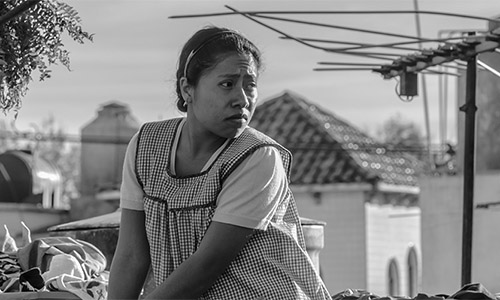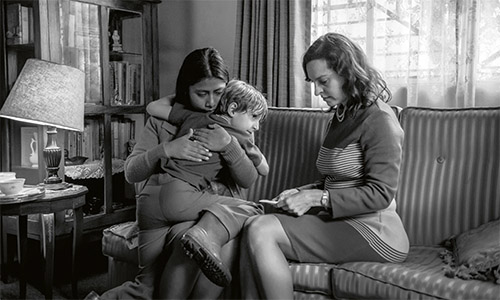 Not all Best Picture winners are the best movies of the year. Unlike a team competition like the Super Bowl or World Series or an individual competition like a Spelling Bee or a marathon, awards in the arts are very subjective. Some sports, such as gymnastics, diving, boxing, and many reality shows (American Idol, America’s Got Talent), are also based on judge’s scores. Still, for the most part, I don’t think there is much of a difference between who the judges feel the best is and who the public believes the best is. Of the big Awards shows (Grammy, Oscar, Emmy, Tony, Country Music Awards, Golden Globes, etc.) The most diverse are music and television shows. I say music shows because there is no more significant distinction in personal taste in any art than there is when it comes to music. I say television because there is no way that every critic can watch every show nominated for awards, especially in 2018, when most of the shows that get nominated in the seemingly dozens upon dozens of unique categories are shows that the average person has never heard of. And for those shows, the voters usually watch just a single episode that gets nominated. This means that it is somewhat impossible to get to know these characters, nor is it possible to see the arc of where the show was or where it is going. Movie award shows are simpler, especially feature-length films (the types of films I review), because there are usually no more than 15-20 movies that get nominated.
Not all Best Picture winners are the best movies of the year. Unlike a team competition like the Super Bowl or World Series or an individual competition like a Spelling Bee or a marathon, awards in the arts are very subjective. Some sports, such as gymnastics, diving, boxing, and many reality shows (American Idol, America’s Got Talent), are also based on judge’s scores. Still, for the most part, I don’t think there is much of a difference between who the judges feel the best is and who the public believes the best is. Of the big Awards shows (Grammy, Oscar, Emmy, Tony, Country Music Awards, Golden Globes, etc.) The most diverse are music and television shows. I say music shows because there is no more significant distinction in personal taste in any art than there is when it comes to music. I say television because there is no way that every critic can watch every show nominated for awards, especially in 2018, when most of the shows that get nominated in the seemingly dozens upon dozens of unique categories are shows that the average person has never heard of. And for those shows, the voters usually watch just a single episode that gets nominated. This means that it is somewhat impossible to get to know these characters, nor is it possible to see the arc of where the show was or where it is going. Movie award shows are simpler, especially feature-length films (the types of films I review), because there are usually no more than 15-20 movies that get nominated.
In my life (I was born in 1976), my Top Movie of the Year has matched up with the Best Picture winner just times (Gladiator in 2000, Titanic in 1997, Braveheart in 1995, Rocky in 1976). While there have been many times when my Best Picture was a movie that I had ranked either second or third, there have been many times when the film that the Academy picked as its winner failed to make my Top Ten list. This will be the case this year with Roma. Alfonso Cuarón (Gravity, Children of Men) is a household name despite having just seven feature-length movies to his credit (one was a Harry Potter movie). He put his name forever on the map when he was awarded Best Achievement in Directing for 2013’s Gravity, a film that nabbed seven of the ten Oscar nominations it received. There is absolutely nothing wrong with his latest film, Roma. It deserves its ten Oscar nominations and the half dozen it might receive, including Best Director and Best Picture. It was a movie that, more than anything, was hurt by its release.
Roma is a Netflix movie. It was screened in a handful of theaters in a few different cities (a requirement to receive Academy Award nominations). Still, Netflix funded Cuarón’s movie, and that’s how 99% of audiences will view it. And it’s a shame. Not because Netflix funded it. Netflix is an incredible company creating some of the most amazing television shows (and now movies) we’ve seen in the last decade. I am grateful for the quality of the programming that Netflix continues to release. However, this movie was filmed in black and white and subtitled. Each of these experiences is better on a big screen than on a small one. Together, it made it an almost impossible movie-watching experience for me. I have a nice-sized television in my small family room.
I feel like I give films their fair chance to impress me. But I had to watch the first 30 minutes of this film three different times because it was so slow-paced and dull in the beginning. These three other attempts to watch the film occurred over almost a month. Watching this movie becomes homework, more than an escape. This isn’t the only time this has happened to me as a “movie critic,” but it was one of the most painful. As my blog’s tagline plainly states, “I review movies that I watch that I feel like writing about.” However, there are exceptions. I review each Best Picture nomination, except on rare occasions, I review the movies nominated in the other five major awards (Director, Actor, Actress, Supporting Actor, Supporting Actress). Roma was a film I had to power through and review for these reasons alone. At 2 hours and 15 minutes, though, it wasn’t like I was devoting much unnecessary time to it.

With all of the above said, I recommend Roma. The payoff is worth the struggle to get through. It is by no means the feel-good movie of the year, but as I sit back and reflect on it, there weren’t many movies that checked all of the boxes that Cuarón checked. I don’t know if there were any. Of the nine nominated movies for Best Picture, only two (A Star is Born #1 and Green Book #4) made my Top 10 list (Vice was my #11 at the time of this writing). But when I compare those two movies against Roma, they don’t match up in many categories. While I absolutely adored Green Book (a movie I thought would be boring), it wasn’t difficult to make. Its success was through its two main characters (Viggo Mortensen was rightfully nominated for Best Actor, and Mahershala Ali will win for Best Supporting Actor). It was a nearly perfect movie (much like 2016’s Sully), but I didn’t feel anything was challenging. A perfect script sat there. The right two men were brought on to star as the leads. And everything else took care of itself. Likewise, I loved A Star is Born. I’ve debated whether that or the equally captivating Widows is my favorite movie of the year. It will end up being A Star is Born because of its longer-lasting effect on me. But this movie was flawed as well.
First, it had been made three times before, so it wasn’t original. I know the project had been in the works for years since the most recent (1976) remake but had frequently been abandoned before production started. I also know that many people told Bradley Cooper not to make this his directorial debut. I’m so grateful that he did not heed that advice because he directed an absolute masterpiece and deserved a Best Director. He pieced together a captivatingly tragic love story that put entirely to shame what Pawel Pawlikowski (Cold War) and Yorgos Lanthimos (The Favourite), the two directors who I felt should not have been nominated, did with their movies. Cooper and Lady Gaga were fantastic in their roles as the film’s leads, but the film wasn’t perfect. The development of the relationship midway through was rushed. Rather than getting more of the concrete scenes that showed the progression of their relationship and the love that was developing through them, we get too many flyby scenes of them together (almost like we were watching a Nicholas Sparks YA romance), and then when the shit hit the fan, and the Cooper’s character’s struggles reared their ugly heads, there was nothing there for me to believe that Gaga’s character cared for him enough that she couldn’t just up and leave. IMO, their relationship wasn’t deep enough for her not to be able to walk away when he began to turn ton mean towards her, and his addictions consumed his life.
Suppose they had been together for a more extended period of time, sure. But this was an instant-bake type of relationship. That was my problem with it. The other six movies nominated for Best Picture, which I did not refer to here, were equally flawed. And, honestly, Roma was not. And that’s why, despite my problems with its pace, the development of its non-lead character, and the way that I was forced to watch (at home, trying to read subtitles on a black and white background of a 40″ television rather than in a gigantic movie theater, I believe it was the Best Picture nomination that had the fewest problems with it (Bohemian Rhapsody and BlacKKKlansman were both great movies but were hurt by many historical inaccuracies that I wasn’t able to overlook). And it’s why I think Roma is the favorite to win Best Picture this year (next week at the time of this writing). It’s also why, while I hope it doesn’t win Best Picture (I want A Star is Born to win), it is why I think it should and will win the award.
As mentioned, Roma is brilliantly and excruciatingly filmed in black and white and contains no musical score. I understand why Cuaron did this. He wanted the characters and the story to be the film’s color and sound. Set against the backdrop of the internal discord and social rank amidst the political turmoil of 1970s Mexico City, Roma tells the personal story of a young domestic worker named Cleo (newcomer Yalitza Aparicio) who spends her days tending to their four children – Toño, Paco, Pepe, and Sofi, taking care of the dogs, and cleaning the house for of a wealthy family in a middle-class neighborhood of Roma in Mexico City. The family she tends to is so well off that they can afford a second housekeeper in Adela (newcomer Nancy Garcia), with whom Cleo forms a close friendship. The father and head of the household is Antonio (newcomer Fernando Grediaga), a well-to-do doctor. There is friction between him and his wife Sofia (Marina de Tavira – television’s The Lord of the Skies). Antonia isn’t around much. He’s continually leaving for “work trips” despite the practice that he works at being in the heart of Mexico City. We met him several times before he took an extended work trip to Canada, but his return date is uncertain.

But this story isn’t about the family. It is about Cleo. Aparicio and Cuaron create the most sympathetic character you’ll meet on screen this year. Cleo is the character you can rally behind and root for in a year of movies that brought us numerous sympathetic characters. Here, we have a young woman struggling to get by and taking the opportunity to appreciate every opportunity she is presented with. We only know a little about Cleo’s life before accepting the housekeeper job, but from the beginning, we know how loyal she is. Cleo isn’t going anywhere. She cares deeply for the four children. She loves this family. And while she knows she’s just a housekeeper, an innate part of her believes she is something more. For the most part, Sofia and Sofia’s mother, Teresa (Veronica Garcia), makes her feel that she is as well. But, of course, life gets in the way at times, and there are a couple of incidents that, unfortunately, remind Cleo of who she is, which is a poor housekeeper who, at any time, could be sent back to the streets. But, even after knowing Cleo for a short time, we know that she will not do anything to jeopardize that situation knowingly.
But Cleo isn’t a robot. While I’m uncertain if she has any real hopes or dreams for herself or if she ever thought she would be more than a housekeeper at any point in her upbringing, she still seeks fulfillment and happiness. And she has very few escapes from the four children she is helping to raise. But on rare occasions, she gets out; she likes to go to the movies and interact with people her age. So she begins dating the conceded Fermin (Jorge Antonio Guerrero – Narcos: Season 3), the cousin of Adela’s boyfriend and a man practicing martial arts expert, for reasons unexplained. But he has no problem showing off his martial arts skills, almost showing off his superiority to Cleo minutes after sleeping with her for the first time. Cleo watches, unimpressed and confused, the narcissistic Fermin and, perhaps, wonders what sort of mess she got herself into. But here is a good-looking man with aspirations who has interested her, and maybe that’s enough for her.
I’ve just written about the film’s incredibly dull and slow parts. With a really good subtitled movie, you forget you are even reading subtitles. Unfortunately, that wasn’t the case with Roma for me. There wasn’t a lot of dialogue, but when characters spoke, what they said felt so important that I found myself straining my eyes on my small screen to read it. In this respect, it was fortunate that there wasn’t a lot of action in this film. But, boy, was there some tragedy. If you can make it through the first 90 minutes and are still vested (which will be hard if you aren’t giving it your 100% attention…toss that cell phone to the other couch), you will be rewarded. I don’t think reward is the right word because it becomes challenging to watch once you get behind Cleo. But things will come full circle, and you will see that this is a perfectly crafted poem for those willing to meet it halfway.
Cuaron purposely shot this film from a distance. This is another deterrent to watching it at home. We aren’t with the characters during most of this film. We are watching them as bystanders and might be watching them from a comfortable distance. I’ve mentioned the purposely deliberate pacing as well. This will frustrate many. For example, we spend three or four minutes watching Antonio park his car. No words are spoken. We watch (as his family does) him meticulously driving this large Cadillac into this extremely narrow garage. There are quite a few scenes like this that some viewers will find maddening. I’m uncertain how these enhanced the film’s purpose, though I’m not questioning Cuaron in this his most personal film to date.
Roma is Cuaron’s perfect vision played with lead actors who have yet to experience in the acting profession. In doing so, he created characters we, as moviegoers, couldn’t say, “Oh, she’s very different from when she was in ‘ABC’ movie.” There was no comparison, and that was very purposeful on his end. Instead, Cuaron takes us to 1970’s Mexico and lets us experience his narrative. Through his direction and the performance of his lead, we are treated to an experience that we just aren’t going to get anywhere else.
Plot 9/10
Character Development 9/10
Character Chemistry 8/10
Acting 8.5/10
Screenplay 9/10
Directing 9/10
Cinematography 10/10
Sound 10/10 (no score whatsoever, which was so intentional and so right)
Hook and Reel 5/10 (zzzzzz…..)
Universal Relevance 10/10
87.5%
B-
Movies You Might Like If You Liked This Movie
- The Cold War
- The Boy in the Striped Pajamas
- Nebraska
- Minari
- Parasite